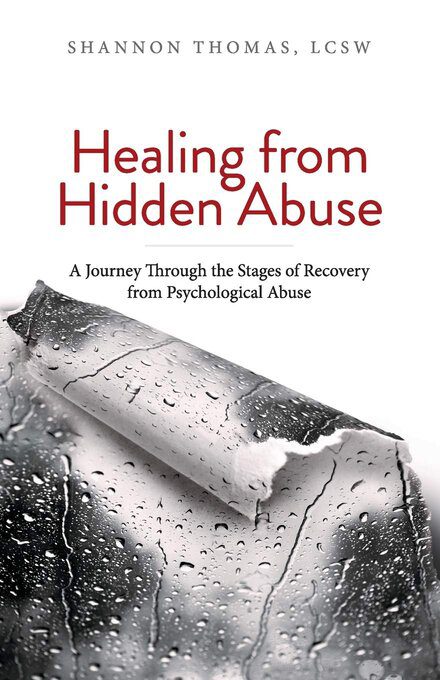Psychological abuse leaves no bruises. There are no broken bones. There are no holes in the walls. The bruises, brokenness, and holes are held tightly within the target of the abuse.
In Healing from Hidden Abuse: A Journey Through the Stages of Recovery from Psychological Abuse, author and certified trauma therapist Shannon Thomas describes a roadmap for healing from hidden psychological abuse. What makes Psychological abuse challenging to explain “Psychological abuse leaves no bruises. There are no broken bones. There are no holes in the walls. The bruises, brokenness, and holes are held tightly within the target of the abuse.” Most Psychological abuse survivors don’t have the right language, insights, and strategies to navigate the roller coaster of living or dealing with someone with a personality disordered individual.
Shanon shed more light on the favorite tools of the Psychological abuser such as Gaslighting, Hoovering, use of flying monkeys, smear campaign, Intermittent Reinforcement, etc. She also explains the six stages for recovering from Psychological abuse.
Within every community, toxic people can be found hiding in families, couples, companies, and places of worship. The cryptic nature of psychological abuse involves repetitious mind games played by one individual or a group of people.
Why is psychological abuse also referred to as hidden abuse?
The behaviors of the abuser(s) involve chronic and repetitive secret games being played by one individual, or a group of people against a target. These actions are so well disguised that their venom frequently goes unnoticed. It is similar to clear toxins placed in a glass of water; one cannot see the injury being done until the body starts reacting to the prolonged exposure of the poison. This is exactly the way abusers plan it with psychological abuse. Covert, hidden, sneaky, and off-the-radar are all part of their agenda.
Psychological abusers set out to trick people, and they know exactly what they do. They actually know better than anyone the lies they tell, the games they play, and the enjoyment they derive from controlling others
Psychologically abusive people can only maintain normalcy for short spurts of time. Being an authentically caring, decent person isn’t baseline for them. They must fake the behaviors that would show these positive character qualities. These fraudulent acts of kindness have brief shelf lives before they expire and the abusers return to their normal state of affairs.
Survivors who try to get help to protect themselves and their children are often seen as hysterical, crazy, and unstable. This is because the covert nature of hidden abuse is very difficult to put into words. Without the correct language, survivors often sound obsessed.
“I just wanted a soul mate. I didn’t want a degree in psychology.”

- A Narcissist will run you over and scold you for being in their way. They will endlessly complain about how you damaged their car.
- A Sociopath will run you over, scold you for being in their way, and have a smirk because secretly they get entertainment out of the chaos they’ve created.
- A Psychopath will go to great lengths and take calculated steps to ensure they run you over, laugh while doing it, and back up to make sure the most damage is done.
The differences between the three terms of narcissist, sociopath, and psychopath centers around the intensity of toxicity that is present within the individual who chooses to remain disordered and not address their lack of authentic attachments to other people.
Pseudomutality
There is a clinical term called “pseudomutality,” and it relates to many harmful families. The word describes those relatives who appear to have some level of connection and agreement, but in fact, have very dysfunctional and harmful relationships behind the public image. The façade presented to the world is a close-knit family, but the reality is a shallow and destructive unit.
Psychologically abusive families can never be without a targeted victim. Otherwise, they would have to look at their own individual issues and deal with them. That is not likely to happen.
Codependent vs Empath
- Codependency involves an unhealthy enmeshment that occurs between two people. It usually happens in relationships where one person enables the other individual to make poor choices. People who struggle with codependency can learn new ways of thinking and behaving.
- Being an Empath is a personality type, and it has many beautiful qualities. Like any set of character traits, there will be pros and cons. People who identify as being highly empathetic will benefit from learning how to keep their levels of empathy from becoming harmful to their well-being.
Boundaries are the foundation for regulating a high degree of compassion for other people.
Psychological abusers exploit the exact traits that most empaths find beautiful in themselves. In recovery, many survivors begin to self-identify as being highly empathetic. They see that their relationship strengths were used against them by the abuser.
Hoovering
“Hoovering” is when the toxic person tries to get the victim to re-engage in the relationship by sucking the victim back into contact. The hoovering can either be positive attention from the toxic person or negative attention to engage the victim in an argument, etc.
Obligation
Obligation is a powerful driver when we are raised in environments that teach us to ignore our safety and well-being. Who wants to prove an abuser right by acting selfishly and not showing up for family in times of need? But how exactly are selfishness or need defined? Abusive families have a knack for stirring up drama just so they can have the spotlight of attention and appear needy. It’s hard to know which is a real necessity and not a manufactured one.
Self-Reflection
As a generalization, most survivors are able to critically look at their own behaviors and motives. They are willing to fix character defects within themselves. These personal strengths are precisely what narcissists, sociopaths, and psychopaths exploit. A toxic person knows if they hurl accusations at a survivor, those words will pierce deep. They cause the survivor to look inward to reflect on whether the complaints against them are true. Quite the clever diversion tactic. It is the psychological abuser who needs to do more self-reflection, but that will never, ever, happen.
SIX STAGES OF RECOVERY
STAGE ONE: DESPAIR
A deep sorrow is often how Stage One is described. A soul sorrow. A level of exhaustion that is at times hard to explain. If you have experienced it, you know what it feels like deep within you. No amount of sleep can touch a weary and bruised soul. The challenge to Stage One is knowing whether we have really arrived at a point of true despair and change will come, or if it’s just a temporary low point.
The subtle nature of psychological abuse leaves survivors doubting themselves, but confidence is found in the healing process.
In a nutshell, the Despair stage is not pretty. It is the stage where the survivor realizes careers have been lost because of the chaos the abuser has brought into the survivor’s life. It is the stage where some clients need hospitalization to find physical and/or emotional stability. For some, it is an intensely lonely stage because on the outside no one knows the raging pain going on inside.
The truths that are hard to look at are the exact things a weary soul must see in order to be driven to change current life situations.
STAGE TWO: EDUCATION
Psychological abuse is exceptionally insidious and therefore misunderstood. That is precisely part of the abuser(s) tactic to keep the abuse hidden and remain firmly in control. A victim cannot begin recovery if they can’t describe what has been done to them. Learning the common methods employed by psychological abusers is Stage Two. Survivors new to recovery should know what the following terms mean in relationship to psychological abuse:
- Gaslighting
When an abuser gaslights, he or she sets up situations to make the target doubt their own memories and assessments of situations. This is done in order that survivors will become so unsure of themselves they hand over reign of their lives to the abusers. Surely if the targets are as unreliable as the abusers show them to be, how can they possibly manage themselves? This is exactly the plan. - Smear Campaign
If psychological abusers cannot get their targets to question themselves – and turn inward to self-loathing – the abusers will surely try to turn the opinions of others against the survivors. Perhaps both tactics will be used. A smear campaign is meant to either isolate the target so he or she only has the abuser to turn to for “help,” or it is meant to prove that the abuser is justified in their treatment of the survivor.
- Flying Monkeys
The idea of flying monkeys comes from the movie, The Wizard of Oz and how the Wicked Witch of the West used her troop of monkeys to fly off and do the evil work for her. Toxic people manipulate two types of helpers to do their dirty work:
1) innocent people who don’t see the abuse, and
2) individuals who purposefully ignore the abuse.
Toxic people have an incredible ability to triangulate their helpers into abusing survivors. This is done on purpose so the toxic person’s hands stay clean from the abuse. It’s hard to pin responsibility on an abuser when he or she wasn’t even in the same room when the offense took place.
- Narcissistic Offense
Narcissistic Offense happens when survivors attempt to show toxic people the mistakes they made, or talk about an obvious need for growth in an area of their lives. Rather than taking the comments as they were intended, psychological abusers will either lash out or give the silent treatment. Perhaps even a combination of a few different forms of punishment will be utilized.
- Intermittent Reinforcement
Intermittent reinforcement is basically how people are brainwashed. B.F. Skinner developed a term called “operant conditioning.” This sort of conditioning trains survivors to anxiously anticipate when abusers will intermittently reinforce the connection between the two individuals. There is no rhyme or reason to their level of attention or affection. Sometimes it is based on the survivor playing by the abuser’s rules.
- Idealize, Devalue, and Discard Phases
Idealize/Love Bombing
The Idealize phase is when manipulators and their new targets first meet. You were once the new target. In this phase, abusers are sizing you up, listening, and learning everything they can about you. This is done so they can mirror back someone who would be the perfect romantic partner, co-worker, or friend. It is during this phase that any survivor feels incredibly lucky to have found someone so wonderful to be his or her mentor, best friend, or even soul mate.
Love bombing occurs when a toxic person floods the target’s world with expressions of love. It is often done quickly in the relationship, and in a manner that amplifies the body chemistry (e.g., oxytocin and dopamine). These biochemical changes in the target are normal when someone is falling in love.
Devalue Stage
The Devalue phase is when the survivor’s world starts to suddenly implode. Remember all that love bombing and extra attention that was present earlier? Those exact compliments and attention now become all the rocks that are thrown at the target. Stone by stone. Bruise by bruise. The survivor’s perfect romantic interest, mentor, or friend has abruptly turned on her or him. It’s a crushing season in life. How could someone who once professed love, or deep respect, now be the exact same person who is stealthily abusive? Welcome to the vile world of personality-disordered people.
Discard Stage
The target was acquired (Idealize phase), the target was emotionally harmed (Devalue phase),and now we begin the grand finale of rejecting the target (Discard phase). The reason this last phase differs vastly from other relationship endings is because a survivor is left – not only with the loss of connection – but their entire personhood has been shredded as well.
STAGE THREE: AWAKENING
At this stage, a survivor may start to feel empowered in their recovery journey. However, there are good days and bad days. It is common for survivors to swing back to Despair and then forward to Awakening again. This is normal and part of the process of deprogramming and healing from the psychological abuse. This is also the stage where anger may really arrive onto the scene. People often say that this stage of awakening brings out a level of feistiness survivors have not previously experienced. They say things like:
- “I can believe evil is real in the world. I have seen it.”
- “What I have lived through actually has a name, and other people know what I have experienced.”
- “That troll had me convinced I was the problem!”
- “Turns out, I am not bat-crazy after all.”
- “I can’t believe they have done this to me.”
It is a stage of coming to terms with the, “How dare they treat me like this?” question.
Stage Four: Boundaries
This is the time when survivors choose to implement Detached Contact or No Contact. The important part of this stage is that a survivor is able to gain enough emotional distance to detox from the trauma bonding and start looking forward to their life of recovery. Boundaries are individually driven and must be done in a way that will be followed through on by the survivor. At times, survivors waiver on setting limits with their abuser(s). To set healthy limits may mean the end of the relationship. It is not uncommon for some survivors to get stuck at this stage.
Detached Contact
It is about staying emotionally distant while in the presence of toxic people. It is not about limiting contact and still being overwhelmingly triggered the entire time.
No Contact
It is the most concrete way of moving forward and away from abuse. At some point along the timeline of being in contact with a narcissist, sociopath, or psychopath, many survivors will come to a place where they recognize that the toxic person provides no value to their life.
Psychological abusers use brainwashing techniques to embed certain ideas in their targets. Thoughts like:
- You’ll end up alone.
- This job is the only path to reach your career goals.
- This church is the only one God is really using in a dynamic way to do His will.
- Your family will always be there for you, but friends come and go.
STAGE FIVE: RESTORATION
This is the stage where individuals are allowed to start dreaming. They have walked the road of recovery enough to begin adding back what was robbed during the abuse. No longer are they in the process of living one day at a time, but are healed at a level that they now desire true restoration. They ache for newness and vibrancy.
Hope is the theme of Stage Five. All things becoming new is the spirit of Stage Five.
For everything, there is a season. Restoration should come at the time when it can be life-giving, not overwhelming.
Whenever we face our past wounds, fear will be there whispering all the reasons we should not even try.
STAGE SIX: MAINTENANCE
During this sixth and last stage, survivors will often willingly loop back to earlier stages and experience deeper levels of healing. The Maintenance stage also involves being able to experience healthy relationships going forward and identify toxic people quicker than previously. Maintenance is when a survivor fully lives their life of recovery with the confidence and skills to keep themselves safe from future abuse.
At this stage in the process, some survivors are accused of being too rigid or guarded. Generally, I do not think that is true at all. Survivors who struggled through the rough terrain to reach the mountain top have become selective about whom they want around them. Not all people we meet deserve to be in our inner circles. Survivors have worked way too hard to develop clean living to then allow unhealthy people to remain in close proximity. Those two worlds do not go together.
An individual doesn’t even have to be “toxic” to be undeserving of a place in your life. Access to you is a gift. The ability to call you, text you, e-mail you, see you, come to your home, and basically share space in your life is earned, not easily given. At least it should be. It is yours to parcel out as you choose.
Toxic is Toxic
If you have implemented Detached Contact, the final stage of recovery can be difficult because toxic people are not toxic every day. They have their good moments too, and those can be confusing for a survivor. Remember, no matter how pleasant a toxic person may behave for a short period of time, they will always return to their baseline abusive behaviors.
Remember, no matter how pleasant a toxic person may behave for a short period of time, they will always return to their baseline abusive behaviors.
Without the ability to exercise the internal emotional muscle of willfully leaving a harmful environment, survivors are vulnerable to falling into a codependent trap in the future. Having the ability to say “No more” and then follow through by removing themselves from the environment is a necessity to a life of recovery from psychological abuse.
The New You
A key component to Maintenance is recognizing that you are a new person. You have grown, changed, and are an improved version of yourself. Hopefully, that trajectory of healthy living will continue upward. It is important to see yourself in the newness that is now yours. There are sad consequences if we do not recognize that our old selves have faded away. Insecurity will drive us to push away happy, successful people because we do not think we deserve their attention.
If we don’t believe we deserve things like real love, peace of mind, and hope, we will subconsciously sabotage ourselves.
Our inner dialogue and self-worth will determine the type of people we allow – or reject – in our lives. If we don’t believe we deserve things like real love, peace of mind, and hope, we will subconsciously sabotage ourselves. We will wonder why we never have them in our life. We can live aimlessly and keep being drawn to the same type of unhealthy people. Instead, we need to fully see that we are different and improved individuals. A new group of people will be attracted to us as well.
All the Best in your quest to get Better. Don’t Settle: Live with Passion.



3 Comments
Pingback: On Boundaries. – Lanre Dahunsi
Pingback: Top Quotes on Codependency. – Lanre Dahunsi
Pingback: On Codependency. – Lanre Dahunsi